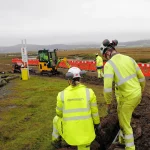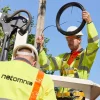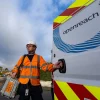Enders Analysis Warns Largest UK Broadband Altnets Lost £1.5bn in 2024

The latest annual report from analyst firm Enders Analysis – seen by ISPreview – has calculated that the UK’s largest alternative gigabit broadband networks (i.e. BT / Openreach challengers) collectively suffered losses of £1.5bn in 2024 (up from £1.304bn in 2023 and £755m in 2022) – driven by high interest rates and rising build costs. But it suggests that many may never make a profit.
According to Enders, the industry has now accumulated a total debt pile of £9bn and financing costs equated to an average 121% of revenue being generated last year. The average FTTP network penetration rate across the industry now stands at about 15% (up slightly from 12% in 2023), with most being a long way from the 40% seen by Enders as the level needed to become sustainably profitable (take note that 40% is not a hard rule and will vary, depending on cost to build and the type of areas being built across – e.g. rural often delivers higher take-up, but costs much more to build).
Regular readers won’t be surprised by this, as ISPreview has often reported on the challenges being experienced by network operators over the past three years. The situation has been fuelled by rising build costs, strong competition from rivals (i.e. overbuild and the challenges of growing take-up) and the difficulties of securing fresh investment during a period of high interest rates (not to mention rising debt repayments).
Advertisement
In response, many altnets have adopted a more protectionist strategy, which involves scaling-back or pausing new fibre deployments and switching their focus to growing customer take-up (commercialisation). Some other network operators and investment firms have also gone on a consolidation drive in an effort to capitalise on the difficult climate and grow scale to hopefully generate better returns (e.g. CityFibre), but this has gone slower than some expected.
Extract from Enders Analysis Report
Looking forward, for retail altnets (i.e. all except CityFibre) the outlook remains very bleak. The ISP incumbents are starting to respond to market share losses to the altnets, with average incumbent new customer pricing down c.7% year-on-year in the September 2025 quarter, and some altnets having to respond with even cheaper prices of their own, so improved ARPU [Average Revenue Per User] looks unlikely, and increasing use of contract buy-outs is putting upwards pressure on SACs [Subscriber Acquisition Cost]. By our estimates, at current ARPU and SAC levels even a theoretical highly efficient altnet cannot make a return on new customer acquisition even with all network coverage capex written off.
…
CityFibre, the largest altnet and the only one purely focused on wholesale, is in a slightly different position, with the Sky wholesale win giving it a realistic prospect of getting to 40-50% penetration levels, and its Q3 subscriber net adds nearly doubled on recent trends. Its economics based off 2024 metrics are still very weak, with ARPU of £15 and a calculated £240 connection ‘bonus’ per new subscriber, which make it very hard for it to make money even if it writes off its coverage capex.
One catch is that consolidation remains a very complex business, not least due to the inevitably slow and expensive process of needing to integrate different networks that may not have been built to the same standard. In addition, some network operators, such as those that exist in more heavily overbuilt areas, may have an inflated opinion of their own asset value, which can make it harder to reach an agreement.
In addition, it’s also clear that some major UK banks have scaled back their support for altnets, with NatWest and Lloyds being two examples that now seem to be expecting to take some losses on related loans (here and here). “It’s difficult to see a scenario in which retail altnets generate cash returns, even before interest costs on their debt,” said Karen Egan, Head of Telecoms at Enders Analysis.
Overall, it remains a tough environment and there’s still a long way to go before we can see how all of this is going to pan out, but the feeling is that all of the above factors may be starting to reach a crunch point that should help focus minds, drive realism where it’s needed and produce more consolidation. But before that we may yet see more painful restructuring and job cuts, even from some of the bigger altnets.
Advertisement
All the recent talk of consolidation around Gigaclear, Netomnia, CityFibre, nexfibre (VMO2) and others helps to illustrate some of the above points (here and here). But the longer this all takes, the harder the hit for many investors.
Mark is a professional technology writer, IT consultant and computer engineer from Dorset (England), he also founded ISPreview in 1999 and enjoys analysing the latest telecoms and broadband developments. Find me on X (Twitter), Mastodon, Facebook, BlueSky, Threads.net and Linkedin.
« GoFibre Complete Project Gigabit Broadband Rollout Contract for Teesdale UK




















































Enders Analysis just reinvented the wheel. They somehow thought that investment such like this will become profitable on the one. It is all about endless debt that is supplying money to creditors.
*profitable from day one.
It beats me how they still find investors willing to invest in UK infrastructure. It always seems to end up in disaster.
Money makes money, simple as that. If the creditor is a bank then they don’t need to have that money, they just create it virtually and make it real when debtor is paying off.
Why are we still building deep rural fibre that costs a fortune to install and will never ever make a profit for the owner due to ongoing maintenance costs exceeding the revenue potential?! Time to give up and do it differently. Use some of the current funding to subsidise LEO monthly charges until the price comes down to comparable levels, even some long term subsidy makes more economic sense than installing very long rural fibre to serve very few users. The other advantage of course is the speed of deployment.
But there’s a different report that says that investing in rural fibre will grow the economy, create jobs, reverse global warming and give everyone a free teaspoon. If you want your forecast to be right then you have to produce a lot of them. One of them might stick.
no more subsidies, it is time to accept that there is no money. If someone chose to live away from civilization then he should just get Starlink
I have not seen the report, but this would seem to be Enders finally confirming what others have been saying for more than a year.
They said more or less the same thing in last year’s report, too.
@Mark:
Gotcha. I have not seen that report either. It is good, however, that they are in a position to put some fairly recent numbers on the topic.
I think it is likely that we will see some businesses fall, or even be put into administration, rather than being active participants in the consolidation process.
It was always a classic investment bubble.
Credit to Sky and TalkTalk who realised early on and pulled out.
Cable consolidation did not have overbuilding by other new companies and hundreds of retailers offering services on existing networks. Retailers who were already battle hardened.
Crazy thinking that BT as the flag carrier would not overbuild.
I see only tears for altnets and more CEOs being ousted by the banks next year.
Well I won’t be shedding a tear for the ousted CEOs. Most of them appear to have personally done very nicely thank you even though the companies themselves appear to be mostly basket cases.
Cablecos also had the benefit of regional exclusivity (no overbuilding) and BT prevented from competing in a meaningful manner.
Altnets have inexplicably been overbuilding each other, let alone the massive competitive pressure they face from Openreach and Virgin alike. My own street has two altnets plus Openreach (who were first to FTTP). The nearby town is OR + VM + CF, all offering broadly the same service. How was that ever supposed to lead to financial success, even with the massive leg up given through overly generous access to Openreach infrastructure?
@Ivor it wasn’t ever supposed to succeed. Recent FFTH strategy in the UK has been a classic neo-liberal “the market can solve all issues” fraud on the public. Other countries have entirely avoided the issues the UK now faces because their governments actually did the work of regulating and planning public infrastructure build in the interest of the citizenry.
We will now see a lot of bankruptcies and a lot of consolidation. The vast sums wasted can’t be unspent, but government could still step in to regulate the consolidations (for example, VM should not be allowed to buy Netomnia) and maintain as much competition in the broadband market as possible.
If they don’t it will be the public that will likely end up footing the bill for the UK’s hugely inefficient fibre roll. The past failures have already resulted in a UK broadband market with one of the highest costs per Mb of bandwidth and in the UK being the only country in Western Europe where broadband prices have risen over the last two years
£9,000,000,000 total debt PLUS whatever the government gave them in public money as a subsidy to the insanity.
Madness, absolute madness. The only thing to say in their defence is that at least broadband access is useful, certainly more useful than a 17th Century Amsterdam tulip.
Plus any investment that was equity based.
The only people making any money out of this is the subcontractors putting the physical cables and ducts in to the ground. Half the time these Alt nets subcontract to the same companies and don’t hold any direct labour force, so they’re the only real winners while everyone else is left chasing promises.
Well hopefully we will still end up with something resembling a third national network to compete with Openreach & VMO2/Nexfibre. The original investors will no doubt take a nasty haircut but if the country benefits….
Sadly unlikely, with VirginO2 likely to buy up Netomina, it looks like we will beck to the duopoly of Openreach and Virgin.
Checking my records in that I first identified the challenges that the Altnets would face (it was 2003 to be specific). Not gloating, or being a smartarse (far from it) but I do question as to whom investors spoke to before investing?
Answers on the back of a fag packet?
In that case you should’ve been an advisor to the Government. Kudos to you.